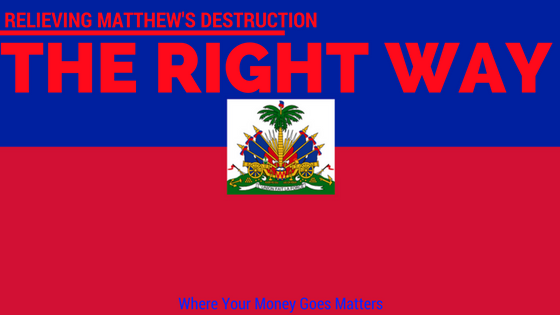
In the wake of a disaster, human beings are unique in their desire to help.
Almost as one, we stand up and ask how we can help. Can we send food? Can we send supplies? Can we offer our homes, our money or even words of encouragement to help in times of absolute need?
When Hurricane Matthew swept through the Caribbean it left behind it a path of destruction, death and despair while making its way to the southeast United States. Lacking a solidified government and the advanced infrastructure that nations like the United States or the Bahamas can tout, Haiti was devastated by the severe weather. The death count continues to climb, currently over 1,000 according to the Huffington Post.
Amidst news of death, destroyed infrastructure, displaced people and decimated morale across the small island nation, humans around the world rose to help. In almost a mirror image of the aftermath of Hurricane Katrina, the American Red Cross allowed people to donate money quickly and efficiently to Haiti’s relief efforts simply by texting a number.
But suddenly, things changed abruptly–reports came in that some people were warning Americans not to donate to the American Red Cross for Haiti relief. In fact, it was the Haitians, in large part, who were warning against it. They claimed that the donations in past disaster relief efforts had been largely squandered.
At this point in time, it may be in the best interest to listen to them. Understanding where your donations are going is the single most important part of making a charitable donation. Having the knowledge that your funds are being lost simply lining the pockets of the employees at a nonprofit, being poorly managed, or otherwise being called into question should put a halt in your donations quickly.
You know by now that you should do your due diligence when deciding on a charity to which you’ll donate some money. But sometimes it takes more than a simple Google search to make a conclusion. CharityWatch gives the ARC an A- rating–proof that they can (and often do!) coordinate large scale efforts and help those in need. But foreign relief efforts are often best handed by foreign NGOs, or ones that work closely with foreign governments.
A natural disaster, especially one that has claimed so many lives and devastated entire countries is worthy of an extra charitable look. These people are people–human beings–who need help that they simply cannot provide for themselves. However, times of dire need are not the times to begin throwing caution to the wind. Make sure that the nonprofits that you’re donating to are both legitimate and appropriately use their funds in the most efficient way possible.
To help Haiti with Hurricane Matthew relief, consider donating directly to Doctors Without Borders or Help for Haiti, two relief efforts that are primed to make a difference.